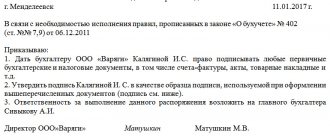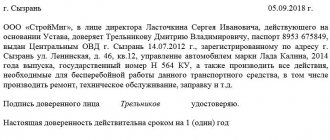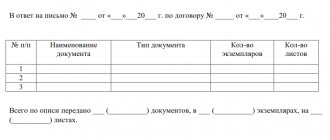Quite often in organizations a situation arises when a manager or other authorized person is absent from the workplace for a long time, for example, on a business trip, vacation or for other reasons.
But since work in the organization does not stop at this time, the question arises of who can sign this or that document for an absent person?
You can entrust the signing of relevant documents in an organization to an employee by issuing an order and (or) a power of attorney for the right to sign.
Basic provisions about the power of attorney, the procedure for issuing it, certification, validity period, etc. Contained in articles 185-189 of the Civil Code of the Russian Federation.
Give signing rights to all employees with the company's electronic signature
By default, the program has this operating mode: documents can be signed by the manager and employees who have the company’s electronic signature. To check who has the right to sign documents in your company, open the organization card and go to the “Who signs documents” section.
Please note that in this mode you trust all employees who have a suitable electronic signature to sign any electronic documents .
To limit the list of representatives or the set of documents, set up rights for those who have signatory rights.
Signing personnel documentation
The Labor Code does not contain direct rules regulating the transfer of powers of the head of an organization to sign employment contracts and other personnel documents to other persons, but repeatedly mentions the very possibility of such a transfer. Thus, the article of the Labor Code of the Russian Federation determines that the rights and obligations of the employer in labor relations can be exercised, among other things, by authorized persons. At the same time, it is said that the powers of such persons are formalized in the manner established by the constituent documents of the organization and local regulations. And the article of the Labor Code of the Russian Federation notes that one of the mandatory conditions of an employment contract is information about the representative of the employer who signed the employment contract, and the basis on which this representative is vested with the appropriate powers. However, this article does not contain any specification of the procedure for delegation of powers.
The possibility of signing orders and other local regulations on personnel matters not only by the head of the organization, but also by another authorized person is also indicated by the by-laws that regulate the procedure for filling out primary accounting personnel documentation. For example, in the Instructions for the use and completion of forms of primary accounting documentation for the accounting of labor and its payment (approved by Resolution of the State Statistics Committee of Russia dated 01/05/04 No. 1; hereinafter referred to as Instructions for filling out unified forms) it is said that the order for employment (form No. T-1) can be signed not only by the manager, but also by an authorized person. However, these Instructions do not stipulate how to formalize the authority of such a person, and what changes need to be made to Form No. T-1 if it is signed by an authorized person.
Fill out and print out an order using form No. T‑1 for free
Unfortunately, the Plenum of the Supreme Court of the Russian Federation in its resolution of March 17, 2004 No. 2 “On the application by the courts of the Russian Federation of the Labor Code of the Russian Federation” also did not answer the question of how to formalize the delegation of the right to sign personnel documents. Paragraph 12 of this resolution only states that the representative of the employer is a person who, in accordance with the constituent documents of a legal entity or local regulations or by virtue of an employment contract concluded with this person, is endowed with the appropriate powers. In other words, in order to transfer the right to sign personnel documents, it is necessary to provide for the procedure for such transfer in the local regulatory act of the organization or make a corresponding clause in the employment contract concluded with an authorized person. However, the judges of the Supreme Court of the Russian Federation did not specify what specific documents can be used to confirm the temporary transfer of powers of a manager, and in particular, whether it is necessary to issue a power of attorney to an authorized person.
There are no formal grounds for issuing a power of attorney in this case, since labor legislation does not contain such a requirement. The provisions of Article 185 of the Civil Code of the Russian Federation that a power of attorney is issued to delegate the powers of a manager are not mandatory when transferring powers to sign personnel documents. Indeed, by virtue of the provisions of the article of the Labor Code of the Russian Federation, labor relations are regulated by labor legislation, which consists of the Labor Code, other federal laws and laws of constituent entities of the Russian Federation containing labor law norms. That is, the Civil Code, which contains norms of civil (and not labor) law, is not a normative legal act regulating labor relations.
However, courts do not always recognize that in order to transfer the authority of a manager to sign personnel documents, it is enough to issue an appropriate local regulatory act (for example, an order). Often, arbitrators require that in this case an additional power of attorney be issued to the authorized person (see Resolution of the Federal Antimonopoly Service of the Moscow District dated 01/09/04 No. KG-A41/10211-03). Although sometimes organizations still manage to defend in court personnel decisions made by an authorized person who acted only on the basis of an order (see resolution of the Federal Antimonopoly Service of the East Siberian District dated March 12, 2009 No. A19-7218/07-57-5-52-F02- 826/09).
Let's draw a conclusion. To avoid challenging and recognizing as illegal personnel decisions made by an authorized person, it is better to issue a power of attorney for him. Moreover, this does not contradict the law. After all, it is clear that an authorized person, when signing employment contracts, local acts and other personnel documents, does not act on his own behalf, but represents the interests of the employing organization. And legislative regulation of the issue of representing the interests of a legal entity before third parties is provided only by the norms of the Civil Code. Therefore, if an organization, in order to avoid risks, decides to issue a power of attorney to sign personnel documents, then when drawing it up, it is necessary to take into account the provisions of the Civil Code of the Russian Federation on power of attorney.
In the power of attorney issued to the authorized person, it is necessary to indicate exactly what actions in the “personnel department” on behalf of the organization he has the right to perform, and to establish the term of office. It is also advisable to note that the authorized person acts on behalf of the organization not as an individual, but as an employee of the organization holding a certain position. This will not allow him to abuse the granted rights in the event of dismissal, and will also limit the scope of the power of attorney to the “territory” of the organization, since information from the company’s staffing table will be needed to confirm his powers.
The wording of the power of attorney in this case may be as follows:
Limited Liability Company "Lazurit-FS" represented by Director Dmitry Anatolyevich Nikolaev, acting on the basis of the Charter, authorizes Ivan Dmitrievich Petrov (indicate passport details, date and place of birth, place of residence, etc.), holding the position of head of the department, with this power of attorney personnel of the Limited Liability Company "Lazurit-FS",...
Let's summarize. Labor legislation provides for the possibility of transferring the manager’s authority to sign personnel documents to third parties. At the same time, the Labor Code of the Russian Federation does not give a clear answer to the question of how to formalize the delegation of powers of the head of an organization, requiring only that the procedure for such delegation be fixed in local regulations or constituent documents. Judicial practice often requires additional execution of a power of attorney.
Since the authorized person in the situation under consideration represents the interests of the legal entity, and the procedure for registering such representation is fixed in the Civil Code, then in the case of delegation of authority to sign personnel documents, the power of attorney is drawn up according to the rules provided for by this code.
Maintain HR records in the web service for free
Grant signature rights to specific employees
- Open the organization card.
- In the “Who signs the documents” block, click and select “Execute” in the “Power of Attorney” section.
- In the opened power of attorney, indicate who and to whom transfers the right to sign documents or reports, the term of office, and the number of the power of attorney. Mark the documents that this employee is allowed to sign.
The manager may reserve the right to approve documents, and entrust the authorized employee with the right
only reject incoming documents.
If company documents will be signed by power of attorney
, in the “If there is no power of attorney, sign documents” field, set the switch to the “prohibited” position.
To print the power of attorney for signature, click .
What to consider when drawing up a power of attorney
- If you have delegated the right to sign the reports to an authorized representative, do not forget to provide a paper power of attorney to the tax office before sending the first report. After this, with each report, an information message about the power of attorney will be automatically transmitted - an electronic document containing the details of the paper power of attorney.
- The power of attorney for reporting will also be displayed in the report - note that it is signed by a representative, and select the full name as in the power of attorney.
- You can delegate signing powers in another way: simply entrust the use of your electronic signature to another employee.
NTVP "Kedr - Consultant"
LLC "NTVP "Kedr - Consultant" » Pravo-info » Articles from magazines » ABOUT SIGNATURES ON PRIMARY DOCUMENTS
Based on materials from the magazine “MAIN BOOK. CONFERENCE HALL"
M.N. Akhtanina
The old Law on Accounting required that the list of persons authorized to sign primary documents be approved by the head of the organization in agreement with the chief accountant. The new Law does not provide for either approval of the list or its agreement with anyone. At the same time, according to the Ministry of Finance, the head of the company must still determine the list of persons who have the right to sign primary documents.
One of the following documents can confirm authority to sign documents:
— internal administrative document for the organization (an order signed by the head or a regulation approved by him on the right to sign on documents);
- a power of attorney on behalf of the organization, drawn up in accordance with the requirements of the Civil Code, that is, again signed by the head.
What is the difference between a power of attorney and an order? An order for the right to sign documents on behalf of the organization is issued to specific officials working in the company and is valid for the entire duration of the employment relationship with these employees. That is, the order formalizes the distribution of powers within the organization.
Usually, an order delegates the right to sign those documents that never leave the walls of the organization. Indeed, as a general rule, a company’s internal administrative documents do not apply to third parties (who are not on its staff). In very rare cases, regulations establish that the right to sign a specific type of document on behalf of an organization is granted to other persons by order. These documents include invoices.
But it happens that counterparties require a power of attorney in order to verify the authority of the person signing the document. Then, in order to avoid unnecessary disputes, you can issue a power of attorney or both an order and a power of attorney.
A power of attorney, unlike an order, is always issued to a specific individual, and not to a person holding a specific position. You can indicate the position in the power of attorney, but this is not required. Typically, a power of attorney is issued for a specific period. If the validity period is not specified in the power of attorney, then it is valid for a year from the date of its execution.
You cannot do without a power of attorney when transferring the right to sign primary documents on behalf of the company to a person who is not its employee.
When we are talking about an employee of an organization, it should be reflected in his employment contract or job description, with which he must be familiarized with his signature, his obligation to draw up primary documents, the right to sign which he is granted.
And despite the fact that the law does not oblige the manager to approve a list of persons authorized to sign documents on behalf of the company, drawing up and approving such a list will not hurt.
It’s good when everyone in the organization knows who is responsible for the execution of a specific document and for its timely receipt by the accounting department.
Let us separately focus on the signature of the chief accountant in the primary account. As you remember, the old Law N 129-FZ stated that without the signature of the chief accountant, monetary and settlement documents are considered invalid and should not be accepted for execution. There is no such provision in Law No. 402-FZ. This means that the chief accountant’s signature may not be on the primary document. But there are a number of exceptions.
First, cash documents. Bank of Russia Directive N 3210-U states that cash documents must be signed by the chief accountant, although the manager can authorize another person. So for the validity of these documents, the signature of the chief accountant is not required if they were signed by another authorized employee. But the chief accountant himself does not need a power of attorney or an order to sign cash documents. He has the right to sign these documents by virtue of his position.
Secondly, invoices. Everything is the same here - the Tax Code requires the signature of the chief accountant, but allows the transfer of these powers to another person.
Read the full text of the seminar in the journal “Glavnaya Kniga. Conference hall"
2015, N 03
Specify the employee who will confirm receipt of documents
In a standard setup, anyone with signatory authority can acknowledge receipt of documents and reports. This will also allow the employee to authorize the use of electronic signatures during delayed signing or file decryption and more.
To select a user who will perform these functions, indicate him in the “Receipt of documents confirms with his signature” field.
Any signature authority trust created in the VLSI personal account can be
view and print
in the “Our company/Power of Attorney” section. The “Our Companies” tab contains documents issued between your organizations. To “Other companies” - from clients of the authorized accounting department.








